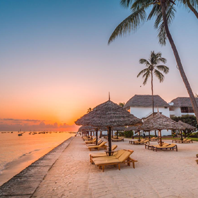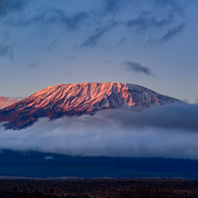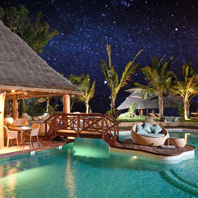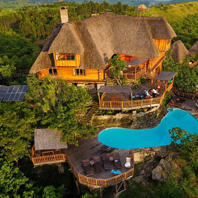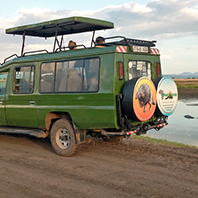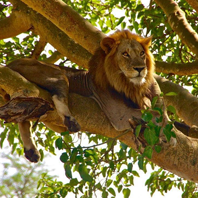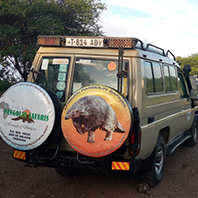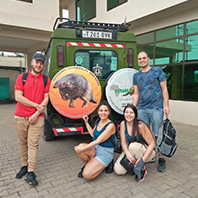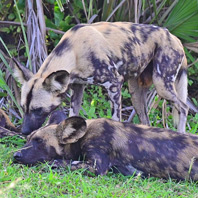Cultural tours are a popular product in Tanzania that is mostly sold as an add-on to enrich main safari tour programs. Most cultural tour sites in mainland Tanzania were developed by the Tanzania Tourist Board (TTB) in conjunction with the Netherlands Development Organisation (SNV), starting with selected villages around Arusha in northern Tanzania and spreading out into other areas. These are traditionally existing villages which have been made accessible to visitors who may have a glimpse of the authentic lifestyle of the more than 120 tribes in rural Tanzania.
Most visitors to Africa, especially first timers, find the continent and its people enchantingly different and a special experience. We at African Pangolin Safaris appreciate this fact and endeavour to include visits to the local communities to give our guests the opportunity to see firsthand the way of life in a typical African village.
Besides enriching itineraries and adding quality to the tours offered in Tanzania, the cultural tours are generating direct income to the local communities that are being visited, contributing to their development. Thus by visiting the cultural sites the guests would be giving support to community health, water supply, primary education and many other social and economic projects carried out at village level as well as reforestation and protection of environment.
Some of the popular cultural centres which may be tailored into visitor itineraries include:
Most visitors to Africa, especially first timers, find the continent and its people enchantingly different and a special experience. We at African Pangolin Safaris appreciate this fact and endeavor to include visits to the local communities to give our guests the opportunity to see firsthand the way of life in a typical African village. Tanzania has over 120 tribes each with its own culture. The Maasai in northern Tanzania are among the most popular ethnic groups in the area, a proud people fervently attached to their cultural values. Ngorongoro is the home of the pastoral Maasai, who have been allowed to live in the conservation area, a pioneering experiment in multi-purpose land use where people, their livestock and wildlife coexist and share the same protected habitat. The Maasai move widely with their herds of cattle, sheep, goats and donkeys in search of pasture and water. In recent years the Maasai have been encouraged to work on the land to supplement their traditional staple food of milk and meat.
While in Ngorongoro most of the guests on safari love to include a visit to a Maasai Boma (homestead). The Seneto Maasai Boma on the western slopes of the Ngorongoro Highlands about two hundred metres off the main road to Serengeti is one of the most famous cultural visitor points for guests. Another popular Maasai village is Irkeepus which is located in the Ngorongoro Highlands and a visit can be combined with a trek of Olmoti or Empakaai Crater. Visitors will be shown around the Maasai Boma, and are welcome to explore the huts where Maasai families live and learn a few things about their way of living. The huts, normally built by women, are made of wood, mud and cow dung.
The visit lasts about 30 to 45 minutes and at the end the villagers will show off and try to sell their colourful beadwork and other handcrafted wares. If time allows the Maasai warriors would challenge men to engage in a spear throwing match or perform a tribal dance, and ladies may choose to participate in beadwork. This is intended to expose visitors to the Maasai culture though briefly and enrich them with some authentic African experiences.
Lake Eyasi is a very scenic soda lake found on the southern border of the Ngorongoro Conservation Area, a couple of hours drive from Karatu. This less visited lake lies at the base of the Eyasi escarpment on the western Great Rift Valley wall, bordered by the Eyasi Escarpment in the northwest and the Kidero Mountains in the south.
This is a hot, dry land, around which live the Hadzabe people, often associated with the Khoisan languages in Southern Africa because of their click language. The Hadzabe are believed to have lived here for nearly 10,000 years and continue to follow hunting-and-gathering traditions. Also in the area are the Iraqw (Mbulu), a people of Cushitic origin who arrived about 2000 years ago, as well as the Datoga also Cushitic, the Maasai and various Bantu groups including the Nyakyusa, Nyamwezi, Chaga and Meru. The area is Tanzania’s main onion-growing centre, and there are impressive irrigation systems along the Chemchem River drawing its water from natural springs.
The Hadzabe, a hunter-gatherer tribe, live close to the shores of Lake Eyasi, as do the Nilotic-speaking Datoga tribe who are pastoralists. Visits to these tribes are possible on half day or full day excursions which would include a visit to their homesteads, learning about their way of life, medicinal plants, and even animal tracking with bows and arrows with the Hadzabe hunters.
Learn the history of underground springs in Lake Eyasi, these springs have the extension of about 1km forming Chemchem River which sustain all irrigation in the basin
The tribes who farm the Lake Eyasi basin include the native Iraqw, the Nyakyusa, Nyamwezi, Chagga, Meru mostly living around the main settlement in the area .Crops being grown around Lake Eyasi include maize, cassava, bananas, potatoes, beans, and onions which is the chief commercial produce found in irrigated farms…
we booked a day tour with african pangolin safaris. they were very responsive and organized a tour for us only one day ahead of our inquiry. it was a wonderful experience!
we booked a one day tour with pangolin safaris. our guide and driver was mansoor, the owner of pangolin safaris.mansoor is an awesome tour guide! he is professional.
everything was great. the best was our driver and guide emanuel. comunnication with mansoor from african pangolin safaris befor our trip was perfect.very kindly attitude from him.

tailor-made trips are tailored to each traveler. they are perfect if you are looking for authentic experiences and prefer to spend more time meeting locals on your trip.
Consistently and successfully providing pocket-friendly travel options to the Tanzania .
consistently and successfully providing pocket-friendly travel options to the tanzania traveler for over two decades is no mean feat and every single day has been a step forward towards our goals for us. over these years, our diligent services have been acknowledged several times by several leading tourism and travel organizations globally.
